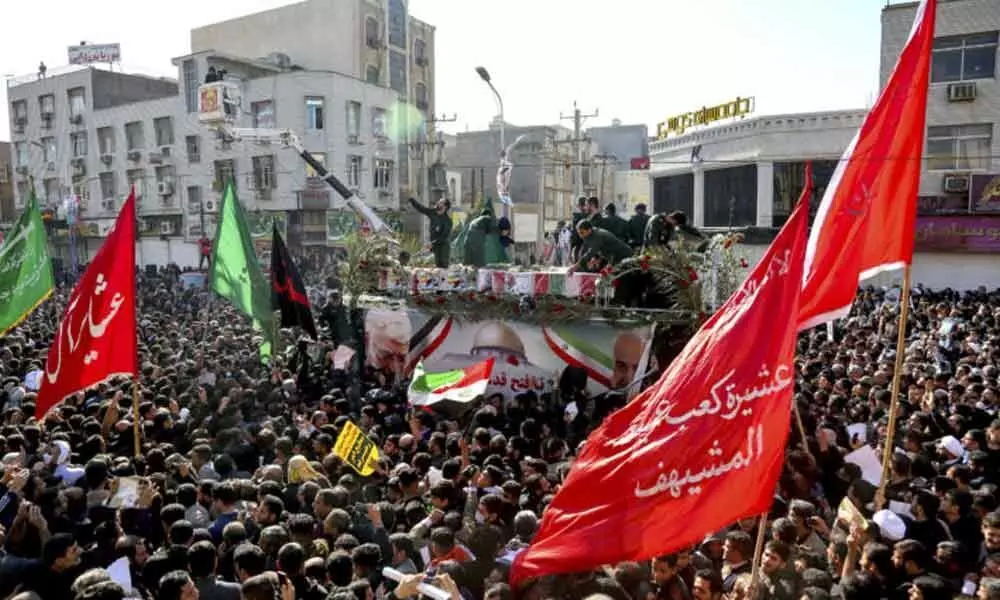Iran abandons nuclear limits after US killing

Tehran: The blowback over the US killing of a top Iranian general mounted Sunday as Iran announced it will no longer abide by the limits contained in the 2015 nuclear deal and Iraq's Parliament called for the expulsion of all American troops from Iraqi soil.
The twin developments could bring Iran closer to building an atomic bomb and enable the Islamic State group to stage a comeback in Iraq, making the Middle East a far more dangerous and unstable place.
Adding to the tensions, U.S. President Donald Trump threatened to demand billions of dollars in compensation from Iraq or impose "sanctions like they've never seen before" if it goes through with expelling U.S. troops.
Iranian state television cited a statement by President Hassan Rouhani's administration saying the country would not observe the nuclear deal's restrictions on fuel enrichment, on the size of its enriched uranium stockpile and on its research and development activities.
"The Islamic Republic of Iran no longer faces any limitations in operations," a state TV broadcaster said.
In Iraq, meanwhile, lawmakers voted in favor of a resolution calling for an end to the foreign military presence in the country, including the estimated 5,200 U.S. troops stationed to help fight Islamic State extremists. The bill is subject to approval by the Iraqi government but has the backing of the outgoing prime minister.
In yet another sign of rising tensions and threats of retaliation over the deadly airstrike, the U.S.-led military coalition in Iraq said it is putting the battle against IS on hold to focus on protecting its own troops and bases.
The string of developments capped a day of mass mourning over Iranian Maj. Gen. Qassem Soleimani, killed in a U.S. drone strike in Baghdad on Friday. Hundreds of thousands of people flooded the streets in the cities of Ahvaz and Mashhad to walk alongside the casket of Soleimani, who was the architect of Iran's proxy wars across the Mideast and was blamed for the deaths of hundreds of Americans in roadside bombings and other attacks.
U.S. President Donald Trump responded to the Iraq Parliament's troop withdrawal vote with a monetary threat, saying the U.S. expected to be paid for its military investments in Iraq before leaving and threatening economic sanctions if the U.S. is not treated properly.
"We have a very extraordinarily expensive air base that's there. It cost billions of dollars to build. Long before my time. We're not leaving unless they pay us back for it," he told reporters aboard Air Force One.
"If they do ask us to leave, if we don't do it in a very friendly basis, we will charge them sanctions like they've never seen before ever. It'll make Iranian sanctions look somewhat tame," he said
He added: "We're not leaving until they pay us back for it."
The leaders of Germany, France and Britain issued a joint statement on Sunday calling on Iran to abide by the terms of the nuclear deal and refrain from conducting or supporting further "violent acts."
German Chancellor Angela Merkel, French President Emmanuel Macron and British Prime Minister Boris Johnson specifically urged Iran to "withdraw all measures" not in line with the 2015 agreement that was intended to stop Tehran from pursuing its atomic weapons program.
Iran insisted that it remains open to negotiations with European partners over its nuclear program. And it did not back off from earlier promises that it wouldn't seek a nuclear weapon.
However, the announcement represents the clearest nuclear proliferation threat yet made by Iran since Trump unilaterally withdrew from the accord in 2018 and reimposed sanctions. It further raises regional tensions, as Iran's longtime foe Israel has promised never to allow Iran to produce an atomic bomb.
Iran did not elaborate on what levels it would immediately reach in its program. Tehran has already broken some of the deal's limits as part of a step-by-step pressure campaign to get sanctions relief. It has increased its production, begun enriching uranium to 5% and restarted enrichment at an underground facility.


